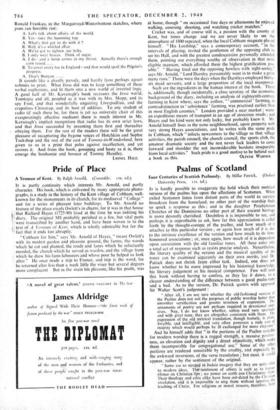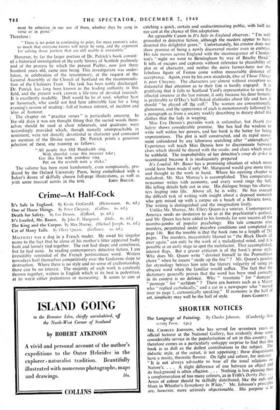Psalms of Scotland
Four Centuries of Scottish Psalmody. By Millar Patrick. (Oxford
University Press. I 2 S. 6(1.) IT is hardly possible to exaggerate the hold which their metric:1i version of the psalms has upon the affections of Scotsmen. Wiwi, exiled Scotsmen listen from distant parts of the world to servic:, broadcast from the homeland, no other part of the worship find, so quick a response as this ; and in the daughter Presbyterian Churches of the Dominions no other part of their ancient heritag: is more devoutly cherished. Doubtless it is impossible to say, anti perhaps it is unprofitable to ask, how far this appreciation is called forth by the thought-content of the psalter, and how -much of 't attaches to this particular version ; or again how much of it is du: to the intrinsic excellence of the version and how much to its time associations ; or, once again, how much of it is dependent upon association with che old familiar tunes. All these enter mid a total act of response such as resists precise analysis. Nevertheless, the literary quality of the version and the musical quality of the tunes can be examined separately on their own merits, and Dr Patrick does not shrink from either task. Indeed, one does not know whether to be more impressed by his historical knowledge. his literary judgement or his musical competence. Few will reaJ this book without having to confess, as they lay it down, to clearer understanding of the difference between a good psalm-tune and a bad. As to the version, Dr. Patrick quotes with approval Sir Walter Scott's judgement : " After all, I am not sure whether the old-fashioned version of the Psalms does not suit the purposes of public worship better than smoother versification and greater terseness of expression. Th: ornaments of poetry are not perhaps required in devotional exer- cises. Nay, I do not know whether, unless used very sparing!, and with great taste, they are altogether consistent with them. The expression of the old metrical translation, though homely, is plate. forcible, and intelligible, and very often possesses a rude sort of majesty which would perhaps be ill exchanged for more elegance. And he himself adds that " in the portions of the Psalter suitable for modern worship there is a rugged strength, a massive positive- ness, an elevation and dignity and a direct objectivity, which make them incomparable for congregational use." Some of the other portions are rendered unsuitable by the crudity, and especially I” the awkward inversions, of the verse translation ; but most. it w3uld appear, rather by the sentiment of the original. " Some are so steeped in Judaic imagery that they are quite alien to modern ideas. The—sentiment of others is such as to initxw silence on Christian lips ; no power on earth can Christianise them. Their theology and ethic alike have been out-dated by the Christian revelation, and it is impossible to sing them without ignoring the teaching of Christ. For religious or moral reasons, therefore. thcr:
must be selectioa in our use of them, whether they be sung in verse or in prose."
Therefore :
" There is no point in continuing to print, for mere custom's sake. so much that everyone knows will never be sung, and the argument for salving those portion that are still usable is irresistible."
However, by far the larger portion of Dr. Patrick's book consist of a historical investigation of the early history of Scottish psalmody and of the process by which the present Psalter, now just three hundred years old, came into being. This investigation was under- taken, in celebration of the tercentenary, at the request of the General Assembly of the Church of Scotland on the recommenda- tion of the Chalmers Trust. The task has been nobly discharged. Dr. Patrick has long been known as the leading authority in this field, and the present work crowns a life-time of devoted research. Jt is excellently readable. Dull would he be of soul, whether Scot or Sassenach, who could not find here admirable fare for a long evening's session of reading ; full of human interest, of incident and also of humour.
The chapter on " practice verses " is particularly amusing. In the old days it was not thought fitting that the sacred words them- selves should be used at choir rehearsals, and quatrains were accordingly provided which, though morally unimpeachable in sentiment, were not directly devotional in character and contained no mention of the Divine name. Dr. Patrick prints a generous selection of these, one running as follows: "All people that Old Hundredth sing, With cheerful voice this measure take; Gar ilka line with grandeur ring, Put on the seventh note a shake."
The volume has been most handsomely, even sumptuously, pro- Ouced by the Oxford University Press, being embellished with a baker's dozen of skilfully chosen full-page illustrations, as well as



































 Previous page
Previous page